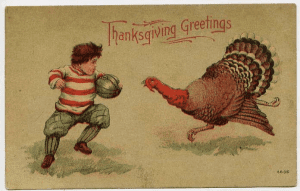 Insufferable calls to insufferable and so the Holiday survival guide is born.
Insufferable calls to insufferable and so the Holiday survival guide is born.
Somewhere a liberal gives tips on surviving conservative relatives, a conservative on how to nap through woke sermonizing. All are insufferable. Someone is already writing the “do not be too happy at the Holidays, because many are sad” while some other scribbler is writing “be happy at the Holidays if you wish.”
The best of this genre, however, is the self-aware commentary that realizes that the sort of person who writes “surviving the holiday pieces” is himself insufferable. This piece is, of course, written by a self-aware person so is also utterly insufferable as it tries to avoid the trap of Holiday smugness. If not terrifically careful, I can be smug about my lack of smugness.
This way lies madness.
What to do?
My own experience of dinner conversation is jolly and fun. My family does not always agree, but I like being with them. I am sorry if that is offensive, but so it is. My dad and mom and I mostly agree. When we do not agree, we talk until we get to the bottom of our disagreement. I do not, I am sure, agree with all my (now adult) children and their beloveds, but that also seems jolly. Who doesn’t like dialogue and learning?
Harmony requires different notes.
Evidently a good many people are so cocooned in bubbles of agreement most of the year that family at the Holidays means forcing them to face people who disagree with them and leads to mental anxiety. If you have grown to be ex-evangelical, then facing them is hard. If you are newly evangelical, then facing them is hard. If you dislike “those ideologues,” then you can become irritating in your absolutist judgment on their judgments.
My own experience says that love, simple love, covers a multitude of perceived sins. If I treat my family the way I wish them to treat me, things (generally) go well. Here are ten principles that have worked for me and might, just might, work for you:
1. Don’t assume people who disagree with you are evil.
Idea! What if you listen to the “crazy” or (insert one of your terms for evil people here) person? What is good about them? What can be learned? Could they be right?
2. Listen.
Do I have to talk as much as I do? When I am not talking, am I listening?
3. Love.
Find what is lovable, focus on the lovable. Ignore the rest.
4. Do unto . . .
If you cannot love your family that you have seen at Thanksgiving dinner, how will you love God whom you have not seen?
5. Allow people to be wrong.
People are complicated: they are more than a bit good and a good bit bad. Judge not that you be not judged.
6. Never agree with things you do not agree with.
This seems easy, but peace at any price is tempting. Do not sell your values like Chamberlain sold the Sudetenland: cheaply. If you disagree, then you might be quiet or calmly disagree. You cannot agree.
7. Put away the smart phone.
We finally meet smart people, or people who are at least related to us, and we talk to those in our enclosed circle by using our devices. ‘Can you believe what I am having to hear?” So says the dad, mom, and daughter with a smart phone. Try not using the thing.
8. Know thy smugness.
Few there be that are not smug: repent, move on.
9. If you cannot stand it, do not go.
Telling the truth and making things better may require not going to an event. Some situations are toxic and some situations are made toxic by the combination of folk. There is no moral imperative to go to a Thanksgiving meal.
10. Life passes quickly, enjoy folks while you can.
If you are with people you love, look at them, cherish them, let go any slight you can. Love them as well as you can so if you face some Holiday without them, you can do so with cherished memories and not a record of text snark to friends.
We do not pick our families (generally). They are we.
Honor. Respect. Duty. Piety.
These are all deep human virtues that transcend particular cultures and times. Most of us are part of cultures that were built on these values and this is a time to cultivate the family virtues. Rootless cultures that cannot honor father and mother, love children, and honor the extended family (aunties, uncles, grands, cousins) are always at risk. Practice may not make perfection, but it does increase the ease of honoring family bonds.
It is a small thing to do, but good.
Lord Jesus Christ, son of God, have mercy on me a sinner.












